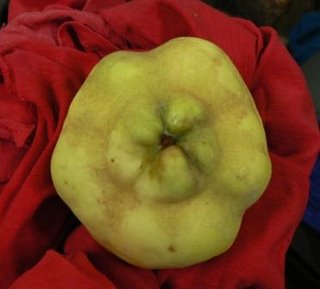
I give. Please explain. It's from Aavin Milk's small but yummy recipe site.

On the day that we made the present recording, I had only just finished playing a rugby match an hour or so before the session. I had no time for a proper shower and still had muddy knees under my long trousers . . . when I expressed some personal dissatisfaction with some of my solo verses (Sir David Willcocks, the director) kindly told me that he had tried to preserve one complete live performance rather than contrive a 'perfect' edited version . . . I have lost track of how many discs of the Allegri have found their way to desert islands!The thought of all these boys sharing this incomparable experience, getting their knees dirty and their minds and hearts filled with thought and examples of kindliness. Well, I was getting downright soppy, angel voices pouring into my ears yet again as I read.
Gregorio Allegri 1582-1652I couldn't read on. I cannot get the image out of my head: boys whose voices had not yet cracked, singing Behold I was shapen in wickedness, and in sin my mother conceived me.
Have mercy upon me, o God, have mercy
after they great goodness.
According to the multitude of thy mercies,
do away mine offences.
Wash me thoroughly from mine iniquity,
and cleanse me from my sin.
For I acknowledge my faults,
and my sin is ever before me.
Against thee only have I sinned,
and done this evil in thy sight,
that thou mightest be justified in thy saying,
and clear when thou judgest.
Behold I was shapen in wickedness,
and in sin my mother conceived me.
A newborn baby or a small child may appear to be innocent, and in no need of God’s grace, but even a baby shares in the rebelliousness of the human race of which it is a part.It is true that people are shapen ungracefully compared to many other creations — snakes, for example, who even age with grace. But wickedness? What is wickedness, but condemning the most vulnerable members of our society? What is wickedness, but condemning a person you know nothing about? What is wickedness, but condemning the born and the bearing, condemning the act of life-making itself? What is wickedness, but condemning love?

 Fess up. What makes you want to do violence to a book?
Fess up. What makes you want to do violence to a book?
"We have to do what we can, right through from the personal level to anywhere we have influence."
That made him irresistible to this vicarious voter, so I asked him if he would grant an interview, and he graciously agreed.
AT: I have a weakness for fools. What makes you think you're up to fool grade?
KB: Funnily enough, there's an invented song I quote in my third novel (Expatria Incorporated, 1992): "In a world of fools he didn't make the grade." That phrase has stuck with me, always in the hope that more andmore of us won't make that particular grade. Sometimes it seems a forlorn hope, but you've got to keep plugging away.
The reference on my "Shifting" diary to me being a fool was simply observing that I have so many things on the go at the moment - running infinity plus, the various strands of my writing career, my part-time job at the university, my family, etc - that the last thing I really need at the moment is to be entering local politics. But one constant throughout my adult life has been my tendency to try to do the right thing, to do the *interesting* thing, and deal with the consequences later. Helping my local Green Party by standing in the local elections is very much A Good Thing, so I'll deal with the pressures on my various commitments when I have to. Somehow.
AT: Low turnouts have been a feature of all recent UK elections, so much so that the BBC asked "Is apathy winning?" What are your thoughts about elections, and is there a difference between local, regional, and national elected bodies?
KB: Turnouts in UK elections can be pretty poor, particularly in local elections. On the other hand, last weekend I knocked on a few doors in the ward where I'm standing: something like fifty per cent of the people who answered were positive about having a Green candidate, and the vast majority were pretty friendly. I don't know how that will translate into turnout on the day, but it's pretty good.
The electoral system - for most elections - in the UK is loaded against the smaller parties, of course. First past the post, gives a straight run-off in each ward/seat, so a party can get a decent proportion of the vote and still end up with no representation. This leads a lot of voters to seeing a vote for a smaller party as a wasted vote, so it reinforces the stranglehold of the mainstream parties.
I think it's tragic that we're still talking about there only being a scattering of Green councillors across the UK, and a handful of representatives at higher levels, while senior politicians can still get away with gesture politics as far as green issues are concerned.
AT: European political belly-button examiners have been saying for years, and still do, despite the best efforts of the current US administration, that today's world is post-democratic". Colin Crouch, for example, in his book Post-Democracy, argues that "the decline of those social classes which had made possible an active and critical mass politics has combined with the rise of global capitalism to produce a self-referential political class more concerned with forging links with wealthy business interests than with pursuing political programmes which meet the concerns of ordinary people."
So where do you fall in the power structure? What do you think of this hypothosis? Is there democracy to be found in Britain? And is there any chance of you becoming Sir Keith?
KB: Ha! If I bunged a few million quid at the Labour party maybe I'd even get a peerage!
I'm not so sure we've moved into a post-democracy: I think it might be more the case that we've never quite realised the aspirations of those in the democratic movement in the last century. Have we ever been in a democracy? The system has always been loaded; it's always been open to abuse by those with money, those with influence, those with muscle.
Communism provides great tools for analysing power structures, but its solutions all failed because they were so susceptible to corruption from within, or pressure from without. Democracy is great in theory, but it,too, is prone to all kinds of abuses and imbalances. Capitalism is a fine model in a world where the market truly reflects the needs andwishes of an informed population, but hey, tell me where that world is!
All these systems are vulnerable to the same corrupting influences that people are: the pursuit of self-interest, the abuse of others, the misuse of power, and so on.
But this is what we're up against. In a world where we desperately need to get our act together so that we can start, on the one hand, to do what we can to minimise climate change and abuse of the environment and all the consequences of these things, and on the other hand, to try to cope with the changes that we've already set in motion ... well, we need to sort out our priorites, and stop bickering over the same old petty domestic rivalries.
Where do I stand in that power structure? Off the scale, unfortunately. Thinking about these issues should be central to all decision-making, not just the remit of a few cranks on the fringes. But it ain't.
AT: If you were elected, what would you hope to do in your post?
KB: Be realistic. I think the Scottish Greens have it right: with only a handful of members of the Scottish Parliament, the Greens aren't in a position to call the shots, but they can influence, raise issues, challenge. They describe this as being the green conscience of Scottish Parliament, and at this stage it's the job of Green councillors to act as the green conscience of the council on which they serve. If we can move Green thinking into every area of council activity then that would
be a big achievement.
AT: How does your family stand in the issue of Keith Brooke, politician?
KB: They laughed quite a lot. They're still laughing. They'll be laughing even more if I get elected and have to work out how to juggle my commitments. But they're behind me. One thing we've been doing as a family (documented in my "Shifting" diary) is trying to demonstrate that you can live sustainably and ethically and still lead a normal life, andI think we've been remarkably successful at that.
AT: Have you been lobbied yet?
KB: Someone asked me, if he gave me a "loan" for the campaign fund, would I make him Baronet of Colchester.
__________________________________________________________
Read Keith Brooke's newest novel just released from Pyr
“If you're looking for great, well-written new science fiction novels by writers you have a reason to trust, then Brooke is now your man. Or at least, he will be when the world gets a chance to crack Brooke's world of Genetopia ..." Agony Column
"British author Brooke's engrossing far-future parable intertwines old, old human questions: Who am I? Where am I? Where am I going? Must I go?...impressively conceived, poignantly drawn..."
Publishers Weekly starred review
 Yes, quinces are lovely baked slowly, stewed Persian style with lamb, or reduced with lots of sugar to make quince paste; but I suggest that you save one quince from these treatments. Don't bake it, sugar it, honey it, smother it, or change it in any way.
Yes, quinces are lovely baked slowly, stewed Persian style with lamb, or reduced with lots of sugar to make quince paste; but I suggest that you save one quince from these treatments. Don't bake it, sugar it, honey it, smother it, or change it in any way.
"Paving the way" is the most common idiom used to describe Australia's new agreement with China to export uranium for their proposed 40 nuclear plants--peaceful uses only, the agreement says (freeing up Chinese uranium for let's not talk about that). "A win-win" as the Chinese call it. Money for Australia (our starving nation) and a great non-global-warming contribution to the world. The Chinese are also are tipped to mine uranium here, in the wonderfully named "Honeymoon Mine".
As Australian troops are still in Iraq, keeping, at last explanation, the world safe for democracy, our newest cuddle- buddy assures us of only peaceful intentions while it threatens to nuke Taiwan, a democratic nation larger than ours that crazily, is not recognised by the world as a nation--but let's not talk about that, especially since Chinese Premier Wen Jiabao told us,"We are ready and we are willing to live in peace with all other nations on this planet."
Looking over at my refrigerator, a thing that was damned when it was born, I really should de-ice it. But, but that reminds me of uranium. Weren't there problems with it, even for peaceful (but let's not talk about that).
It's good to see that some people are speaking up, but the Labor Party in this country is as keen about nuclear as that other enthusiast of the new black for green, Tony Blair.



Cheryl Morgan's posting, Mythical Pets, reminds me of a dinner I was lassoed into a while back, at a vegetarian restaurant, a place with sin sitting in every bain marie. Every vegetable looked like it was shot for a 1950 cookbook. The same grey-green death hue (even if the vegetable should be orange), the same frozen look of expectation to be mistreated (fully realised). The restaurant's specialties (and my dinner-fellows' delights) were all imitation meat: imitation-meat looking and imitation-meat smelling. While my companions bogged into the fried gluten with brown sauce, they wasted no time merely eating. All pure of heart and action, down to the plastic shoes, they talked about the horrors of food today. Talk was serious, as these people are committed. The "KFC genetically modified organisms", bred, as they said, "without feet and head, to save processing costs" incensed them the most.
They have an active mailing list that generously disseminates information and petitions, usually about three times a week, subject headings being prefixed by URGENT, or URGENT URGENT if they're not URGENT URGENT URGENT.